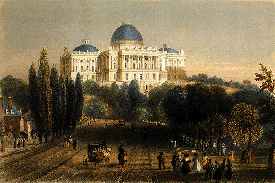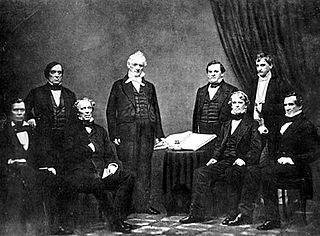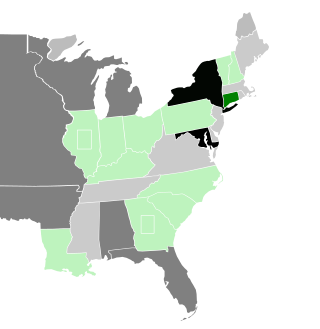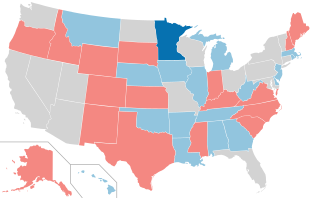Since Alabama became a U.S. state in 1819, it has sent congressional delegations to the United States Senate and United States House of Representatives. Each state elects two senators to serve for six years, and members of the House to two-year terms. Before becoming a state, the Alabama Territory elected a non-voting delegate at-large to Congress from 1818 to 1819.

The 15th United States Congress was a meeting of the legislative branch of the United States federal government, consisting of the United States Senate and the United States House of Representatives. It met in the Old Brick Capitol in Washington, D.C. from March 4, 1817, to March 4, 1819, during the first two years of James Monroe's presidency. The apportionment of seats in the House of Representatives was based on the 1810 United States census. Both chambers had a Democratic-Republican majority.

The 16th United States Congress was a meeting of the legislative branch of the United States federal government, consisting of the United States Senate and the United States House of Representatives. It met in Washington, D.C. from March 4, 1819, to March 4, 1821, during the third and fourth years of James Monroe's presidency. The apportionment of seats in the House of Representatives was based on the 1810 United States census. Both chambers had a Democratic-Republican majority.

Isaac Toucey was an American politician who served as a U.S. senator, U.S. Secretary of the Navy, U.S. Attorney General and the 33rd Governor of Connecticut.
Since Illinois became a U.S. state in 1818, it has sent congressional delegations to the United States Senate and United States House of Representatives. Each state elects two senators to serve for six years, and members of the House to two-year terms. Before becoming a state, the Illinois Territory elected a non-voting delegate at-large to Congress from 1812 to 1818.

Elizur Goodrich was an eighteenth-century American lawyer and politician from Connecticut. He served as a United States representative from Connecticut and Collector of Customs. He was also the brother of US Senator Chauncey Goodrich, son-in-law of Founding Father Oliver Wolcott.

The Connecticut State House of Representatives is the lower house in the Connecticut General Assembly, the state legislature of the U.S. state of Connecticut. The house is composed of 151 members representing an equal number of districts, with each constituency containing nearly 22,600 residents. Representatives are elected to two-year terms with no term limits. The House convenes within the Connecticut State Capitol in Hartford.
The 1818–19 United States House of Representatives elections were held on various dates in various states between April 26, 1818 and August 12, 1819. Each state set its own date for its elections to the House of Representatives before the first session of the 16th United States Congress convened on December 6, 1819. They occurred during President James Monroe's first term. Also, newly admitted Alabama elected its first representatives in September 1819, increasing the size of the House to 186 seats.

The 1812–13 United States House of Representatives elections were held on various dates in various states between August 3, 1812, and April 30, 1813. Each state set its own date for its elections to the House of Representatives before the first session of the 13th United States Congress convened on May 24, 1813. They coincided with James Madison being re-elected president.

William Adams Palmer was an American lawyer and politician. A prominent of the Anti-Masonic Party in the 1830s, he was most notable for his service as a United States Senator from Vermont (1818–1825) and the 13th governor of Vermont (1831–1835).

Samuel Augustus Foot was the 28th Governor of Connecticut as well as a United States representative and Senator.

Richard Dudley Hubbard was a United States representative and the 48th Governor of Connecticut.
The following table indicates the party of elected officials in the U.S. state of Connecticut:

The 1818–19 United States Senate elections were held on various dates in various states. As these U.S. Senate elections were prior to the ratification of the Seventeenth Amendment in 1913, senators were chosen by state legislatures. Senators were elected over a wide range of time throughout 1818 and 1819, and a seat may have been filled months late or remained vacant due to legislative deadlock. In these elections, terms were up for the senators in Class 3.

Pennsylvania elected its members October 13, 1818.

The 1990 United States elections were held on November 6 and elected the members of the 102nd United States Congress. The elections occurred in the middle of Republican President George H. W. Bush's term and during the Gulf War. The Democratic Party slightly built on their control of Congress.

Connecticut elected its seven representatives at-large on a general ticket.

Only five of the seven Connecticut incumbents were re-elected.

In 1818, Uriel Holmes (F) of Connecticut's at-large district resigned from the House. A special election was held to fill the resulting vacancy.
This page is based on this
Wikipedia article Text is available under the
CC BY-SA 4.0 license; additional terms may apply.
Images, videos and audio are available under their respective licenses.














